Looking into the laws and processes of the common nature about us for clues to the origin of man is not unlike looking into the records of the phonograph for the secret of the music which that wonderful instrument voices for us. Something, some active principle or agent, has to invoke the music that slumbers or is latent in these lines.
In like manner some principle or force that we do not see is active in the ground underfoot and in the forms of life about us which is the final secret of the origin of man and of all other creatures. This something is the evolutionary impulse, this innate aspiration of living matter to reach higher and higher forms. “Urge and urge,” says Whitman, “always the procreant urge of the world.” It is in Emerson’s worm “striving to be man.” This “striving” pervades organic nature. Whence its origin science does not assume to say. [Footnote: This passage was written long before I had read Bergson’s Creative Evolution, as were several others of the same import in this volume.]
Then the difference in kind between the mind of man and that of the lower orders makes evolution a doubly hard problem.
Look over the globe and see what a gulf separates man from all other creatures. All the other animals seem akin—as if the product of the same workman. Man, in contrast, seems like an introduction from some other sphere or the outcome of quite other psychological laws; his dominion over them all is so complete and universal. Without their specialization of structure or powers, he yet masters them all and uses them; without their powers of speed, he yet outstrips them; without their strength of tusk and limb, he yet subdues them; without their inerrant instinct, he yet outwits them; without their keenness of eye, ear, and nose, he yet wins in the chase; without their special adaptation to environment, he survives when they perish. A man is marked off from the animals below him, I say, as if he were a being of another sphere. He looks into their eyes and they into his, and no recognition passes; and yet we have to believe that he and they are fruit of the same biologic tree and that their stem forms unite in the same trunk somewhere in the abyss of biologic time.
The rise of man from the lower orders taxes our powers of belief and our faith in the divinity that lurks underfoot far more than did the special creation myth. Creation by omnipotent fiat seems easy when you have the omnipotent being to begin with, but creation through evolution is a kind of cosmic or biologic legerdemain that baffles and bewilders us. It so far transcends all our earthly knowledge and experience and all the flights of our philosophy that we stand speechless before it. It opens a gulf that the imagination cannot clear; it opens vistas from which we instinctively shrink; it opens up abysms of time in which our whole historic period would be but a day; it opens up a world of struggle, delay, waste, failure that palls




